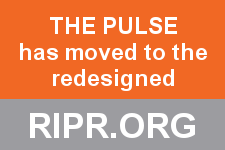How do we talk about obesity?
One of my first feature stories for Rhode Island Public Radio ran this morning during Morning Edition.(Listen here.) It’s about how a hospital realized its staff were dealing with more and more morbidly obese patients but still training on “standard issue” mannequins. So they asked a local puppet and mask maker, Big Nazo, to design something for them. And what Big Nazo Lab came up with is this incredibly creative foam and rubber bariatric training suit. A staffer or trainer wears it so others can practice lifting, moving, and caring for him or her. The bonus is that they get to feel what it’s like to be that big. As a hospital trainer told me, rolling, say, a 450-pound woman on to her side so you can check her back for bedsores is a totally different ballgame from lifting a 110-pound woman. You might need lift equipment in both cases, but for the heavier woman you might need different straps or have to put them under a different place on her body. You might need to slide a heavy woman onto a stretcher with a special slippery sheet, rather than just lifting her with the help of another nursing aide, for instance.
In the story, one of my sources talks about a “person of size.” And a Facebook commenter on the story asked whether that was our new “politically correct” term. I’ve heard the term before but I’m not necessarily interested in using it in my own writing. Yet. Should I be? How should we talk about obesity?
As a reporter, I’m interested in the facts and in telling a story that’s fair, accurate, clear, and engaging. To me, “person of size” just isn’t clear. My dad could be a “person of size:” he’s 6’6″. But he’s also below the average weight for his size.
The language of the newsroom evolves with the culture, of course, but doesn’t dictate it. My guides are my editors, colleagues, trusted experts and sources (including the medical literature and the Associated Press style guide, among others), and the facts. And the facts are that Rhode Islanders are gaining weight and that weight causes major health problems for the carrier and for the people caring for that person. The medical terms are overweight, obese, and morbidly obese, and there are some pretty standard definitions associated with those terms. Should we stick with those when referring to people who meet those criteria? Or is it OK to call someone fat or chubby? How can we wield the tool of language to help the problem and not hurt the people with it? Does changing the way we talk about a problem (like saying “developmentally disabled” and not “retarded”) change the way we treat it? Please (oh boy, I can’t help myself) weigh in.

My opinion, Kristin, is that on this one you have two paths to follow. When you are writing about obesity, eating disorders, or health issues, stick with the medical terms, or if you have the data, give the weight. ‘450-pound woman’ was quite clear! I know that medically speakiing, I am ‘obese’ and I don’t like that term, but it’s the truth. On the other hand, I guess you wouldn’t speak of Governor Chris Christie of New Jersey as a morbidly obese guy. Though ‘big’ or ‘heavy’ are avoidance terms, they’re also polite. One of the problems we’re having as a society is that we are becoming accustomed to obesity, and finding too many ways to avoid addressing the ‘elephant in the living room’ . . . . ourselves.
In cases of addressing obesity as a health issue, I do not think it is necessary to call some fat or chubby when there are perfectly precise medical terms that get across the meaning.
Language about weight sometimes carries moral implications, i.e. fat=lazy, and that is where I think writers can be more careful.
Like the Big Nazo Artist said, art is supposed to make the world a more sensitive place. Maybe that can also be true in the art of language?
Great story by the way! Looking forward to hearing more.
I believe that we can get lost in the semantic and being politically correct. Words ARE important but as I personally know – I did not get a wake up call until I saw the words Obese on my doctors report. It is also important to be factually truthful. I believe that keeping the terms overweight, obese and morbidly obese are actually a good thing and keep us honest in our reporting and our understanding of ourselves.